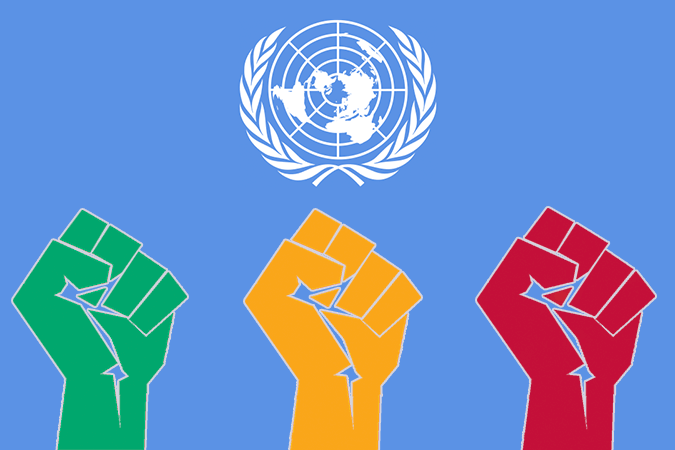This article is written by Dhananjai Singh Rana, from Amity Law School, Noida This article deals with the analysis of the Human Rights Violation with emphasis on the impact in the society.
Table of Contents
Introduction
Human rights are relevant to all folks, not just those that face repression or mistreatment. Human rights are the rights that let all individuals be measured with respect, opportunity, balance, equity, and harmony. Each individual has these rights basically in light of the very fact that they’re people. They’re ensured to everybody without qualification of any sort, for instance, race, shading, sex, language, religion, political or other feelings, national or social source, property, birth, or different status. Human rights are basic to the complete improvement of individuals and networks. Numerous individuals see human rights as basic rules that apply to everybody. Human rights are additionally a part of global law, contained in bargains and affirmations that illuminate explicit rights that nations are required to take care of. Nations frequently join human rights in their own national, state, and related laws.
Elements of Human Rights
They protect you in many areas of your day-to-day life, including:
- your right to have and express your own opinions;
- your right to an education;
- your right to a private and family life; and
- your right not to be mistreated or wrongly punished by the state.
Importance of Human Rights
Human Rights reflect the crucial standards essential for people to live with balance. Basic freedoms offer people the chance to pick how they live, how they convey, and what kind of government they need to help, among various things. Common freedoms in like manner guarantee people the strategies critical to satisfying their crucial requirements, for instance, food, housing, and guidance, so they can take advantage of things being what they are. Finally, by guaranteeing life, opportunity, value, and security, common freedoms guarantee people against abuse by the people who are largely more noteworthy.
The forefront basic freedoms period can be followed to end oppression, demolition, isolation, and government abuse. Shocks during World War II explained that previous undertakings to shield solitary rights from government encroachment were inadequate. Thus was brought into the world the Universal Declaration of Human Rights (UDHR) as a segment of the improvement of the United Nations (UN).
The UDHR was the important worldwide record that enlightened the “crucial normal, political, financial, social, and social rights that each individual should appreciate.” The introduction was affirmed without limitation by the UN General Assembly on December 10, 1948.
Right when it was adopted, the UDHR was not legally official, notwithstanding, it passed on fantastic great weight. To give the basic liberties recorded in the UDHR the force of law, the UN drafted two deals, the International Covenant on Civil and Political Rights (ICCPR) and the International Covenant on Economic, Social and Cultural Rights (ICESCR). The division of rights between these two arrangements is phony, reflecting the overall philosophical hole during the Cold War. Despite the way that administrative issues prevented the development of a united game plan, the two arrangements are interconnected, and the rights contained in one promise are critical as per the general inclination of the rights contained in the other. Together, the UDHR, ICCPR, and ICESCR are known as the International Bill of Human Rights. They contain an exhaustive summary of common freedoms that governing bodies should respect, guarantee, and fulfill.
Convention on Human Rights
It was over fifty years prior, that the global network made plans to make a noteworthy pledge to revere the key privileges of the people for living in any piece of the world. The dedication came as a Universal Declaration of Human Rights (UDHR) embraced by the part conditions of the United Nations General Gathering on December 10, 1948. The revelation sketched out a typical standard of accomplishment for the eventual fate of human rights and has become the foundation of human rights. Notwithstanding, the UDHR is certainly not a coupling arrangement, but instead an affirmation of standards of human rights.
The UDHR which was embraced by the United Nations on December 10, 1948, which contains 30 Articles, determines and unequivocally confirms, among others the following commonly settled upon fundamental rights: the right to life, freedom, and security of an individual (Article 3); the privilege not to be exposed to torment or merciless barbaric or corrupting treatment or discipline (Article 5); the option to approach the security of the law (Article 7).
The privilege not to be exposed to subjective capture, confinement or outcast (Article 9); the privilege to a reasonable and open preliminary by a free and fair council (Article 10); the privilege to the opportunity of thought, still, small voice and religion (Article 18); the privilege to opportunity of assessment and expression (Article 19); the right to freedom of peaceful assembly (Article 20), right to work, equal pay for equal work (Article 23); the right to a standard of living for health and well being including food, clothing, housing and medical care (Article 25); the right to education (Article 26); and the right to a social and international order in which the rights outlined in this Declaration can be fully realized (Article 28). While Article 29 deals with the duties and limitations of individuals in the exercise of rights and freedoms, Article 30 makes provisions for protection against human rights abuses.
Concept of Human Right Violation
There is presently an all-inclusive accord that all people are qualified for certain essential rights under any conditions. These incorporate certain common freedoms and political rights, the most basic of which is the privilege of life and physical security. Human rights are the explanation of the requirement for equity, resilience, common regard, and human nobility in the entirety of our activity. Speaking of rights permits us to communicate the possibility that all people are a piece of the extent of ethical quality and equity.
To secure human rights is to guarantee that individuals get some level of tolerable, altruistic treatment. To disregard the most essential human rights, then again, is to deny people their central good privileges. It is, it might be said, to regard them as though they are not exactly human and undeserving of regard and poise. Models are acts regularly esteemed “wrongdoings against mankind,” including destruction, torment, bondage, assault, implemented cleansing or clinical experimentation, and conscious starvation. Since these arrangements are at times actualized by governments, constraining the over the top intensity of the state is a significant piece of global law. Hidden laws that restrict the different “violations against mankind” is the standard of nondiscrimination and the thought that specific essential rights apply universally.
The various types of violations
The number of passings identified with battle and the inadvertent blow-back brought about by fighting is just a little piece of the huge measure of torment and obliteration brought about by clashes. Throughout the extended clash, attacks on political rights and the center’s right to life are ordinarily broad. Probably the gravest infringement of the privilege to life is slaughtered, the starvation of whole populaces, and annihilation. A massacre is ordinarily comprehended as the deliberate killing of a solitary ethnic, racial, or strict gathering. Murdering bunch individuals, causing them genuine substantial or mental damage, forcing measures to forestall birth, or coercively moving youngsters are altogether approaching to realize the obliteration of a gathering. Annihilation is regularly viewed as the most hostile unspeakable atrocity.
The expression “atrocity” alludes to an infringement of the guidelines of jus in Bello (equity in war) by any individual, regardless of whether military or civilian. The laws of furnished clash forbid assaults on regular citizens and the utilization of weapons that cause pointless affliction or long haul ecological harm. Other atrocities incorporate taking prisoners, terminating on areas that are undefended and without military essentialness, for example, emergency clinics or schools, barbaric treatment of detainees, including organic analyses, and the loot or purposeless pulverization of property. Although banned by global law, such atrocities are normal. As indicated by Kofi Annan, Secretary-General of the United Nations, it is progressively obvious that “the principal aim is the devastation not of armed forces yet of regular folks and whole ethnic gatherings.”
Women and young girls are frequently assaulted by warriors or constrained into prostitution. For quite a while, the global network has neglected to address the issue of sexual brutality during an equipped clash. In any case, rapes, which frequently include sexual mutilation, sexual mortification, and constrained pregnancy, are very normal. Such wrongdoings are persuaded partially by the view that ladies are the “ruins” of war to which officers are entitled. Dealing in ladies is a type of sexual bondage where ladies are shipped across national outskirts and showcased for prostitution. These alleged “comfort ladies” are another case of standardized sexual viciousness against ladies during wartime. Sexual savagery is once in a while seen as an approach to crush male and network pride or mortify men who can’t “secure” their ladies. It is likewise used to quiet ladies who are politically dynamic or essentially cause fear upon the populace on the loose. Mass assaults may likewise shape some portion of a destructive technique, intended to force conditions that lead to the demolition of a whole gathering of individuals. For instance, during the 1990s, the media announced that “assault and other sexual outrages were a conscious and orderly piece of the Bosnian Serb battle for triumph in the war” in previous Yugoslavia.
Instead of executing off entire populaces, government powers may do projects of torment. Torment can be either physical or mental, and focuses on the “embarrassment or demolition of the respect of the individual.” Physical torment may incorporate mutilation, beatings, and electric stun to lips, gums, and genitals. In mental torment, prisoners are at times denied food and water for significant stretches, continued standing upstanding for a considerable length of time, denied rest, or wounded by an elevated level of commotion.
Torment is utilized at times as an approach to do cross-examinations and concentrate on admissions or data. Today, it is progressively utilized as a method for smothering political and ideological difference, or for rebuffing political adversaries who don’t share the philosophy of the decision gathering.
Notwithstanding torment, a huge number of individuals confined regarding clashes “vanish” every year, and are normally slaughtered and covered in secret. Government powers “arrest individuals, hold them stealthily, and afterward decline to recognize duty regarding their whereabouts or destiny.” This kidnapping of people is regularly proposed to make sure about data and spread fear. Much of the time, cross-examinations include dangers and torment, and the individuals who are captured along these lines are killed. Cadavers are covered in plain graves or left at dumpsites trying to hide demonstrations of torment and outline execution of those in authority since individuals vanish suddenly and completely, families don’t know whether their friends and family are alive or dead.
Different lesser types of political abuse are frequently established too. People who represent a danger to people with significant influence or don’t share their political perspectives might be subjectively detained, and either never brought to preliminary or subject to terribly out of line preliminary methodology. Mass gatherings of individuals might be denied the option to cast a ballot or avoid all types of political interest. Or then again, measures limiting individuals’ opportunity of development might be implemented. These incorporate coercive movement, mass removals, and refusals of the option to look for haven or come back to one’s home.
Political mistreatment may likewise appear as segregation. At the point when this happens, essential rights might be precluded on the premise of claiming religion, ethnicity, race, or sex. Politically-sanctioned racial segregation, which denies political rights based on race, is maybe one of the most extreme types of separation. The arrangement of politically-sanctioned racial segregation in South Africa systematized outrageous racial isolation that included laws against interracial marriage or sexual relations and prerequisites for the races to live in various regional zones. Certain people were held to be sub-par by definition and not viewed as full individuals under the law. The laws set up under this framework focused on social control and realized a general public partitioned along racial lines and described by precise negligence for human rights.
What’s more, ladies are exceptionally defenseless against particular kinds of human rights manhandles – notwithstanding the sexual maltreatment referenced above, dug in victimization ladies is predominant in numerous pieces of the world and prompts different types of political and social mistreatment. This incorporates exacting clothing regulations and unforgiving disciplines for sexual “offenses,” which force extreme impediments on ladies’ essential freedoms. What’s more, ladies in certain areas (Africa, for instance) endure more prominent destitution than men and are denied political impact, instruction, and employment preparation.
Role of the government in ensuring Human Rights
The job of the Central government in the acknowledgment of Human Rights is very significant. Human Rights include connections among people, and people, and the state. Along these lines, the useful errand of securing and advancing Human Rights is fundamentally a National one, for which each state must be mindful. At the National level, rights can be best ensured through satisfactory enactment, an autonomous legal executive, the institution and implementation of personal protection and cures, and the foundation of equitable establishments. What’s more, the best instruction and data battles are probably going to be those which are structured and completed at the National or nearby level and which take the neighborhood social and customary setting into account. At the point when states sanction a Human Rights instrument, they either fuse its arrangements directly into their residential enactment or embrace to consent in different manners with the commitments contained in that. In this manner Universal Human Rights measures and standards today discover their articulation in the household laws of most nations. Regularly, anyway, the way that a law exists to secure certain rights isn’t sufficient if these laws don’t likewise accommodate all of the lawful forces and foundations important to guarantee their successful realization.
Human Rights are best ensured under National Systems. This is expected for a few reasons. Initially because a large portion of the International Human Rights instruments regularly leaves the execution to the state parties. Furthermore, the greater part of the International Human Rights Instruments require depletion of household cures, before Human Rights infringement appeal is engaged by International bodies; Thirdly Article 2(7) of the U.N Charter guarantees that U.N won’t meddle in the issues which are inside the local purview of a state.
Landmark Cases
The Supreme Court in Sakshi v. Union of India highlighted the need to establish a procedure that would help the child victim to testify at ease in the court and held that proceedings should be held in cameras. Delhi High Court in Sheba Abidi v. The State of Delhi observed that child victims are entitled to get a support person during the trial and also established that child victims can testify outside the court environment.
In Vishaka v. the State of Rajasthan and reiterated the same in Medha Kotwal Lele v. Union of India. Guidelines for ensuring a safe work environment for women were given and made it mandatory for employers to take responsibility in cases of sexual harassment at work. The Supreme Court also protected the rights of workmen in BALCO Employees Union (Regd.) v. Union of India, Consumer Edu. & Research Centre v. Union of India. In People’s Union for Democratic Rights v. Union of India, the Supreme Court stated that releasing persons from bonded labor was connected to the rehabilitation process to give a full remedy. In Workmen v. Rohtas Industries, the Supreme Court observed that the right to equality became instrumental in protecting the right of workers against unreasonable closures and discrimination in the payment of pensions.
A landmark judgment in D.K. Basu v. State of West Bengal, protected the rights of the prisoners and laid down various guidelines for arrest and detention to prevent custodial violence, and observed that the right to life includes the right to live with human dignity.
Steps that could be taken to prevent violation
1. Know your privileges
The primary method to forestall common liberties infringement is sufficient information on basic freedoms. As we as a whole know, data, and information, the state is power. I don’t get our meaning by knowing your privileges? It just implies that you need to have the information on common liberties and similarly realize what to do and where to go to look for review if your privileges are disregarded.
2. Never give pay off
Probably the most straightforward approach to get abused is giving bribes. It would intrigue you to realize that, if you have to pay off once to get a favor, you are probably going to give pay off, again and again, to complete anything regardless of whether you are not needed or requested to do as such. Accordingly, on the off chance that you have given pay off once and under any conditions, you wouldn’t give pay off some other time because of whatever reason, you are probably going to be abused by your past associates.
3. Demand your privileges
In this piece of the world, I have experienced numerous individuals who are of the view that, demanding your privileges resembles burning through your time since you remain to lose more than you acquire. Nonetheless, what they can be sure of is that, when you demand your rights, it can’t be an exercise in futility, yet all things considered, you are somewhat making the other individual responsible and demanding the proper thing. The time you put resources into demanding your privileges can be supposed to be a period dedicated to public help to your benefit and the overall greatness of the general public.
4. Teach the violator
If individuals are permitted to do some unacceptable thing unchallenged again and again, they later consider such to go about similarly to one side. This implies that once abusing others turns out to be an integral part of individuals, their capacity to consider it to be something incorrectly bites the dust normally. In this way, when you experience a planned violator or an affirmed violator, teach them. At the point when you teach a violator, you are by implication engaging their crude feelings and raising their dead heart. This is notwithstanding the way that you will consistently demand your privileges and never surrender to being disregarded.
5. Be prepared to submit your time
Keep in mind, the rights you appreciate today were not there before now, a few people forfeited their time for you to appreciate such freedom. Hence, on the off chance that others can submit their time for you, you should likewise be prepared to submit your time for yourself. Individuals put time and energy in thinking of the general announcement of human rights, they invested time before the world acknowledged the way that we are completely brought into the world free and equivalent in rights and pride. Hence, what merits doing merits progressing admirably. On the off chance that you need to be instructed, you should be prepared to submit your opportunity to go to class. If you need to be a craftsman, you should be prepared to invest energy in studio’s and if you need to be an essayist, you should be prepared to submit your opportunity to perusing and composing. It’s the equivalent of your privileges. If you need to appreciate a day to day existence without infringement, you should be prepared to contribute your time.
6. Never let go when you are disregarded
At the point when you are disregarded by whoever, never let go. Compose letters, short notes via web-based media, converse with the media, approach the power to whine, and look for a review. On the off chance that need be, connect with the administration of a legal advisor or meet common freedoms associations for help. Note that, If you are abused once, you are probably going to be disregarded again and again again, but tolerating such infringement resembles tolerating disappointment, never acknowledging disappointment. Keep on testing it until you rout it and get equity.
7. Uncover the guilty party and distribute your experience
It is in every case great to take pictures, audio or video records of infringement. Everybody needs to be viewed as acceptable, that is the reason individuals secure their pictures at whatever cost. Families urge their kids to act well openly and never to soil the great name of their family.
At the point when you uncover the guilty party of infringement, such people attempt to deny or address the demonstration. At the point when individuals realize they will be presented and exposed to public criticism, they submit less infringement. If individuals recognize you as a basic liberty safeguard, no one needs to play with you.
Allow me to utilize the case of what occurred in Edo state between Edo state Governor, Adams Oshiomole and the widow broker as of late which prompted the ”proceed to kick the bucket” adventure. If Adams Oshiomole realized he was being recorded, he could never abuse the widow. From the start, when the information on the lead representative abusing the widow broke out, he denied it. Yet, when the video came out, there was no spot to cover up. The lead representative had to apologize and remunerate the widow.
It is important that Governor Oshiomole didn’t apologize or repay the widow since he was heartbroken, he did so in light of the article and mocking that may follow from general society. Indeed, even today, if Governor Oshiomole is sure that no one is watching, he is probably going to abuse others once more. Who knows, he may have done more than 1000 such infringement before he was uncovered.
8. Challenge your infringement in court
Do you recall the case between a well-known Yoruba craftsman, Mr. Babatunde Omidina is prominently known as ”Babasuwe” and NDLEA?
He was captured at the air terminal by NDLEA and blamed for conveying hard medications. Babasuwe was exposed to a few tests which are fine, but they made a special effort by exposing him to a few brutal medicines and toward the end, nothing was found on him. Oyagbe ti, baba suwe said.
After he was liberated, Babasuwe hauled NDLEA to court for misuse and infringement and he was repaid with 25 Million by the court. This is to reveal to you that, for each misuse or infringement you endure, there is pay anticipating you to guarantee it. Qualified to similarly note is that, in a country where public officials disregard individuals effortlessly, a few people’s work is asserting pay from violators, they have no other business. Guarantee yours.
9. Take pictures, voice, or video recording to back up your cases
It is not difficult to keep claims from getting infringement, yet as is commonly said, pictures don’t lie. Notwithstanding, In this advanced time, we have seen pictures lying with a few Photoshop manifestations. In any case, it is imperative to take pictures and if possible, audio and video records. The occurrence where 4 youthful promising and blameless Nigerians were horrifyingly killed with no attempt at being subtle is still new in my memory. What uncovered the offenders was the recorded video posted on the web. Even though the casualties are dead, the violators are by and by under authority going through indictment.
10. Secure the privilege of others
Like the south African well-known saying “Ubuntu”, which implies, I’m since we are. The infringement of one is the infringement of all. In this manner, if somebody is being abused, we must go to their guide and participate in chasing equity. If you see any infringement, call those you realize who can help, if you don’t know anybody, share the story with the media or on the web or some other medium and persuade individuals to know. On the off chance that you don’t approach any of the abovementioned, you are an imperative component yourself. Show concern, the fortitude with the people in question, approach the expert for their benefit or help defy the violator. At the point when you do this for other people, have confidence, many would do likewise for you.
11. Never disregard others
You can’t be a violator and not be disregarded, this is a characteristic law. Common liberties themselves imply, don’t abuse and don’t be disregarded. on the off chance that you abuse others, you will likely be disregarded with nobody going to your guide. A few people disregard others where they are ground-breaking, and sob for being abused in another way. This isn’t right. We are relied upon to secure individuals and not to disregard them in whatever limit we are, just as we anticipate that not should be abused. Realizing how hard we feel when we are abused, we ought to likewise attempt to evade the enticement of making others experience what we would prefer not to experience.
12. Talk cordially and delicately, not strongly with disgusting words
Talking inconsiderately to violators is not a decent method to address them or to secure your right, it makes the casualty more inclined to infringement. At the point when you address individuals harshly, they will in general answer to you in an equivalent manner, and on the off chance that they are in the situation to accomplish more than talk, they do as such with outrage. You should develop the propensity for talking amiably while keeping up your stand. Utilizing vulgar, abusive or offending words while attempting to keep your privileges from being disregarded isn’t awesome. Be developed and mindful both in words and activity.
13. Be correct and stay upstanding
You can’t be right and case right, you must be all in all correct to be ensured by law. However long you are correct, the law will consistently be there to ensure you. Regardless of whether those in power are against you, the law is behind you. Thus, while being on your privileges, you should remain upstanding and not do what might involve or convolute your circumstance. The law can undoubtedly betray you if you demonstrate without thinking about the results. Try not to act rashly severely, be correct, and stay upstanding.
14. Follow up till the end
When you report a case to higher authorities, you must consistently follow up the case. Indeed, even in court, you should follow up to get equity. It isn’t right to report a case and never follow up, it would be accepted that you don’t know of what you announced. Yet, when you report a case, consistently save time to go get some information about the advance and be happy to add extra data if need be. On the off chance that they desert your report and you show up asking, unquestionably, they should keep on chipping away at it until the end. If you didn’t follow it up, you as of now caused them to slaughter the case.
15. Teach everybody around you
A Yoruba saying says, ”olowo kan laa rin olosi mefa, olosi ni ohun na”, implying that, a rich man among 6 destitute individuals is additionally a helpless man. This implies that an informed individual amidst uninformed individuals is additionally an oblivious individual. This can change if the person attempts to teach people around him. It is significant that we teach everybody around us about common freedoms, similarly as we probably are aware, allowing them likewise to know so we can supplement one another. When we as a whole know our privileges, realize where and how to look for review when abused.
Conclusion
Discussing this article is probably going to recognize different issues that should be thought of, just as developing the remarks I have just made. I am sure that the conversation will show the point that the legal executive has a great deal to offer in the progressing banter. The path forward might be moderate, yet the force for the foundation of human rights components in the Pacific district ought to be kept up. As I trust the previous conversation has delineated, I think two issues stand apart as the needy ones. The first is the squeezing requirement for projects to advise networks, from political and business pioneers to the grass underlying foundations of the electorate, and particularly the individuals who endure weakness and imbalance, about the nature, extension, and advantages of the assurance of human rights standards. In this activity NGOs in common society are an important road for proclaiming data – yet they need subsidizing support. Be that as it may, likely the most ideal method of advancing the significance of human rights standards, and in aiding the introduction of instruction projects would be an NHRI. The foundation of NHRIs in States that don’t have one ought to be a significant objective.
References
- http://www.legalservicesindia.com/articles/violation.htm#:~:text=Almost%20everyday%20there%20are%20chilling,several%20other%20human%20rights%20violations.&text=Rights%20are%20merely%20enumerated%20on%20paper%20and%20hence%20remain%20a%20dead%20letter.http://www.lawvedic.com/article/human-rights-violations-an-anathema-to-society-92
- https://world-wire.com/misuse-of-human-rights-an-anathema-to-society/
LawSikho has created a telegram group for exchanging legal knowledge, referrals and various opportunities. You can click on this link and join:
 Serato DJ Crack 2025Serato DJ PRO Crack
Serato DJ Crack 2025Serato DJ PRO Crack












 Allow notifications
Allow notifications


